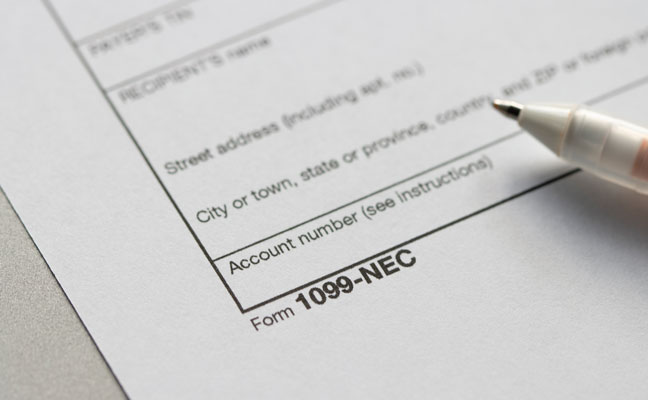
Photo: hapabapa/iStock / Getty Images Plus/Getty Images
With the new year coming up, don’t forget 1099 forms need to be filed by Jan. 31, 2023, for the 2022 tax year. If you have made payments of more than $600 to unincorporated businesses or individuals, you are responsible for filing.
The IRS is increasingly focusing its attention in this area because it is the agency’s main weapon against the under-reporting of income. Penalties for failing to file correct information returns have more than doubled in the past few years alone, while employers, simple Schedule Cs and even single-property landlords are facing intense new scrutiny of their 1099 forms to prevent under-reporting by independent contractors. Failure to file the form for 2022 or providing wrong information could result in a penalty that could be as much as $820 per each omitted 1099.
FILING REQUIREMENTS
The 1099s provide the means of reporting very specific income types from non-employment related sources that might not be captured elsewhere. If you or your business paid someone other than employees on the payroll or for product purchases, the taxing authorities want to know about it. Your business income tax returns even include a question asking whether 1099 forms were filed as required with your signature, under penalty of perjury, certifying your response to be true.

Dan Gordon, CPA
Do not send a 1099 to someone you’ve paid by credit card, debit card or by services like PayPal, Venmo or eBay. Such payments will be included in a 1099K that they will receive from their merchant services provider.
Review all disbursements made from Jan. 1, 2022, through Dec. 31, 2022, summarizing all payments to unincorporated individuals and businesses where the accumulated total is $600 or more. Limited liability companies (LLCs) that elect to be treated as an S Corporation or C Corporation need not be issued 1099s. Be sure to have the correct name, employer identification or social security number and address. If you’re unable to confirm that a particular establishment is a corporation, issuing a 1099 might be a wise precaution. You can’t go wrong sending more 1099s than required, but you can be penalized if you don’t file the forms that are required.
Other potential recipients that are easy to overlook include accountants, lawyers, salespeople, auto mechanics or service stations that repair company vehicles, office cleaners, plumbers, electricians, painters, carpenters, IT consultants, repair people, and vehicle or equipment lessors if they are not incorporated.
FAILING TO FILE
Beyond having to possibly face a government audit, if you fail to file the correct information by the deadline, fail to include all the required information on a tax return, or if you include incorrect information, you can be subject to an array of steep penalties if you cannot show reasonable cause.
A good accounting policy is to require every vendor to complete and provide a W-9 before you pay them. This is the best way to collect the information to determine whether they need a 1099 and, if so, how it should be issued. With the W-9 on file, you can eliminate the hassles of phone calls to individuals wary of giving you their social security number; avoid having to chase down independent contractors who moved (or don’t return phone calls); and avoid having to wait on hold while someone at a vendor’s office tries to track down a federal identification number. Having a W-9 submitted by your vendor on file is the best proof that you complied with the law.
Leave A Comment